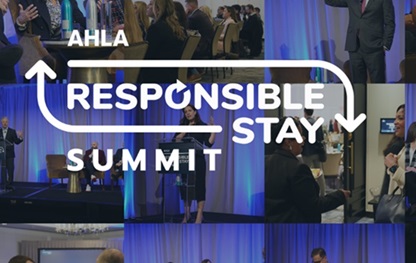 WASHINGTON, D.C.—The American Hotel & Lodging Association (AHLA) last week brought together hotel and sustainability leaders in Washington to highlight the hotel industry’s continued commitment and expanding set of programs regarding environmental sustainability at the second annual Responsible Stay Summit.
WASHINGTON, D.C.—The American Hotel & Lodging Association (AHLA) last week brought together hotel and sustainability leaders in Washington to highlight the hotel industry’s continued commitment and expanding set of programs regarding environmental sustainability at the second annual Responsible Stay Summit.
AHLA member companies are increasingly incorporating environmental goals into their business models. AHLA’s Responsible Stay Summit is designed to help hoteliers continue this work through exclusive discussions on topics like Environmental, Social, and Governance strategies, federal energy policy, and financing the green transition.
This year’s event highlighted two new developments that support these goals:
- AHLA and the Hotel Association of Canada announced a partnership to operate the Green Key Global hotel sustainability certification program in the U.S. and Canada.
- AHLA and Procure Impact launched a Dignity of Work Pledge aimed at creating 100,000 hours of paid employment for underserved populations, which supports responsible sourcing practices.
TED Talks, Panels, and More
The Summit featured several TED Talks, five panel discussions, and other presentations. The following are some highlights:
Dan Feldman, Partner, Covington, in his TED Talk on the “Public & Private Sector: Collaboration Challenges,” emphasized that the efforts of the private sector—the hospitality industry—are critical in limiting the rise in Earth’s average temperature due to greenhouse gases (GHGs). “Every tenth of a degree over the 1.5 degrees in rise of temperature will be catastrophic,” he said.
While many hospitality companies have set targets for reductions in GHGs, “The task now is operationalizing commitments,” Feldman says.
Greg Gershuny, Executive Director Energy and Environment Program, The Aspen Institute, in his TED Talk, said that last year saw a record level of GHGs globally. He said that while 23 percent of energy produced globally is clean energy, much work needs to be done. “Our work is to flatten the speedbumps of progress,” he said.
Host Hotel Initiatives
Igor Morosowski, General Manager of the host Four Seasons Washington, D.C., listed many of the steps his property has taken to reduce energy and water consumption and waste. One key to his hotel’s success: having the Four Seasons for Good Green Team. The hotel eliminated plastic bottle waste with the help of Viktoria Water, which delivers glass bottled water twice a week. The company then takes those bottles back for reuse. The hotel in 2019 used 250,000 plastic water bottles. The hotel’s house car is electric and thanks to a Trash Awareness group in Teams, the hotel has reduced waste-related costs $30,000 a month.
Ben Feller, Partner at maslansky + partners and former Chief White House Correspondent for the Associated Press, gave the keynote address. The title: “How to Talk About ESG, Minimize Backlash, and Grow Favorability.
Feller explained that ESG has become a “dirty word” to some. “What if ESG isn’t the problem and the language is?” he asked. “The biggest problem with ESG is the way it is framed.”
Feller says that most people don’t know what ESG is, and that people fear what they don’t understand.
“ESG fails when it is forced morality,” Feller says. He cited a survey that found Republicans agree that too many people are forcing the ESG issue. When framed financially, however, Republican backlash was less.
“When we change the language, we change the debate,” Feller says.
Feller said that “responsible business” is a much more widely accepted group of words to use and Republicans respond more favorably to it. Using “water responsibly” instead of “managing water stress” is also less apt to cause backlash or resistance.
Focus on DEI
In a panel discussion entitled, “Navigating the ‘S’ of ESG,” DEI (Diversity, Equity & Inclusion) was the focus.
“You have to look different to attract different,” said Kathryn Bryant, Executive Director Travel & Hospitality, Oracle Hospitality.
Leticia Proctor, Executive Vice President, Donohoe Hospitality Services, said a DEI program must start at the top or it will fade quickly.
JoAnna Abrams, CEO, MindClick, moderated a panel entitled, “The Mindful Design Footprint.” She explained that hotels as a group use more energy than the manufacturing sector and that from a cumulative carbon standpoint, interiors of buildings have a greater carbon impact than their structure and envelope.
“Forty to 70 percent of a product’s CO2 comes through manufacturing,” Abrams said.
Laurie Woliung, Senior Director, Interior Design, Marriott International, said there is more furniture in landfills than there is plastic in the ocean.
Woliung added that Marriott is developing a property-level marketing program for Westin and Element hotels that will enable them to tell their green story more easily.
‘Greening Outside the Box’
In a panel session entitled, “Greening Outside the Box: Creative Sustainability,” Lauren Alba, VP of Global Marketing and Communications, Leading Hotels of the World, explained her company’s Sustainability Leaders program. Eighty properties are now Leaders in the program. Hotels designated Sustainability Leaders have achieved a sustainable certification aligned to the Global Sustainable Tourism Council framework and regularly undergo rigorous assessments to verify against these criteria. They maintain a sustainability management plan and demonstrate their commitment through their actions and impact to the three sustainability pillars: Community, Culture and Environment.
Dina Belon-Sayre, President of StayPineapple, which currently has 10 boutique hotels, said that her company’s hotels have numerous sustainability initiatives including giving guests a reusable water bottle in the guestroom and offering electric Zipcars at each hotel. Seventy percent of the portfolio operates on renewable energy and the company’s recycling program is called “Fetch.” Guests are given prizes for recycling.
“Sustainability is a guest value,” Belon-Sayre says. “It is not something we are taking away from them.”
Anick Levesque, Managing Director, Green Key Global, said her company is seeing an increasing number of hotels certified. In an environment where one can be afraid of talking about sustainability—it is sometimes called “greenhushing”—Levesque says certification gives a hotel credibility, making it easier to talk about what one is doing.
The final session, “Responsible Sourcing – A Framework for Success,” included Jen Collins, President, Procure Impact.
“We are working a lot in the hospitality industry,” Collins said. “Where we buy from and who we buy from really matters.”
Through Procure Impact, Collins said one can track the amount of work a purchase creates.
See article on Green Lodging News for more on Procure Impact.
History of Summit
The summit was born out of AHLA’s Responsible Stay initiative. Launched in 2022, Responsible Stay is a hotel-industry-wide commitment to strengthening sustainability that focuses on four core principles: energy efficiency, waste reduction, water conservation, and responsible sourcing.
AHLA offers a host of ways for hoteliers to take steps toward a more sustainable future. These include:
- Signing up here to enroll in the Green Key Global hotel sustainability certification program.
- Working with IncentiFind to identify and take advantage of financial incentives that support sustainability programs.
- Taking the Dignity of Work Pledge to source sustainable goods from underserved populations.
- Learning best practices for curbing food waste via Hotel Kitchen.
- Endorsing the Responsible Stay principles.
“AHLA is proud to host the inspiring Responsible Stay Summit, which is designed to help hoteliers build a more sustainable future for our guests, our industry, and our planet,” said AHLA President & CEO Chip Rogers. “Hoteliers can always count on AHLA for the latest sustainability tools, resources, and best practices in this fast-evolving field.”
Glenn Hasek can be reached at greenlodgingnews@gmail.com.






